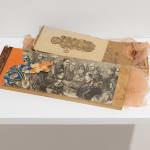


Bruce Conner American, 1933-2008
1 1/8 x 10 3/4 x 4 inches
Further images
The work is housed in a presentation box made by the artist, circa 1963, covered with a collage of a steel engraving, decorated printed papers, black lace, secured with a bolt of coloured gauze fabric.
In 1963 when Bruce Conner returned to the United States after having spent a year living in Mexico, he settled in Brookline, Massachusetts where he continued his artistic practice. He also befriended several musicians working in the Cambridge folk scene, most notably Geoff Muldaur of the Jim Kweskin Jug Band, a friendship that would last 45 years until Conner’s death in 2008. Over the years Conner sent Muldaur a number of gifts ranging from ephemera to prints and collages. The work under consideration here was given to Muldaur while Conner was still living in Massachusetts. To keep the assemblage protected, he decorated a small box with a simple collage and wrapped it with a gauze “bow.” This work was subsequently stored in a chest in Massachusetts for forty years in a trunk until discovered by a Muldaur family member in 2015.
The box that this assemblage has been housed in bears significant hallmarks of the artist’s touch—both in terms of the materials used (without question the engraving and the black lace) but also in that Conner had a penchant for “metaframing” his works—that is, going to something outside the work itself as a way of presenting it—the most well-known example is his Marcel Duchamp Traveling Box (also from 1963) cited in Conner’s interview with Elizabeth Armstrong in the Fall 1994 issue of October Magazine. Conner considered the box not complete until he asked Duchamp whom he had met at a talk to bring it to Conner’s gallery in New York. Conner thus believed in the shamanistic—whether having an artist such as Duchamp delivering an object to complete the work or framing an assemblage in a box tied with gauze to complete that work. Both cases (and there are many more) revel in the idea of gift.
Provenance
Gift of the artist
Private collection of Geoff Muldaur, California



